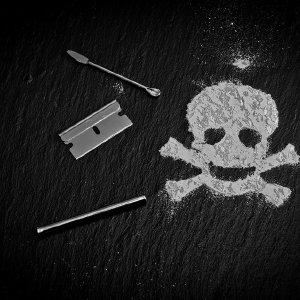Cocaine Addiction Symptoms

Alcohol and other drug helplines periodically receive calls from parents and other loved ones inquiring about the symptoms of cocaine use and addiction. Since the effects of cocaine are generally an acceleration of one’s normal function and abilities, a user can easily mask the signs that would help others identify that the person is drug affected and, more specifically, drug affected by cocaine.
Like many other drugs that intensify normal feelings, like speed-type drugs, i.e. methamphetamines, the effects of cocaine can be hidden if someone is taking a small enough dose where one’s normal actions are not significantly exaggerated. However, the symptoms of cocaine use for the purpose of identifying if someone is using this drug are easier to identify than the symptoms of cocaine addiction.
Definition
Some articles and, so-called, experts claim that cocaine isn’t an addictive drug. This shallow idea of addiction is limited by the belief that an addiction has to be accompanied by physical withdrawals when the drug is removed. It is understandable that there is some confusion about what constitutes an addiction since the definition of addiction among different dictionary sources varies.
Dictionary.com defines addiction as: “the state of being enslaved to a habit or practice or to something that is psychologically or physically habit-forming, as narcotics, to such an extent that its cessation causes severe trauma.”
Signs
Based on a definition of addiction from the World Health Organization’s definition of addiction one would conclude that cocaine is addictive if its effects meet three of the following consequences of its use
- Tolerance: Does the use of cocaine require increasing amounts over time to illicit the same effect?
- Withdrawals: When a person stops using the drug, do they experience physical or emotional cravings and withdrawal symptoms, such as anxiety, sweats, nausea, etc.?
- Negative consequences: Does the user of cocaine continue to use the drug even though they have experienced negative consequences to their mood, their self-esteem, health, family or employment?
- Difficulty controlling the use of cocaine: Does the person using cocaine use more of the drug than he would have liked or intended to use? Does a person stop after one ingestion of cocaine (usually the snorting of a line of cocaine), or does the user want and usually use more?
- Neglecting or postponing responsibilities: Does a cocaine user have the tendency to reduce his social, occupational, recreational or family obligations?
- Time and finance: Does Cocaine use cause the expenditure of time and emotional energy? This would include the time required to plan, purchase, use, or conceal one’s use. Does the person find that his thoughts about using or keeping his use from being exposed require a significant amount of his time and energy?
- Desire to cut back: Does the cocaine user desire to cut down or control his use (which usually is a futile attempt to do either)?
If a user of cocaine answers “yes” to any three of these seven criteria, it would qualify as having an addiction to cocaine. All seven of these symptoms of addiction are exhibited with chronic cocaine use and should dispel the idea that cocaine isn’t addictive.
Tolerance
In terms of tolerance, cocaine users discover that they will require increasing amounts of cocaine to achieve the same drug effect. This is a change in the neurochemistry that is reacting to being stimulated above what is normal. When a person becomes naturally excited, these same chemicals are altered by adrenaline and other hormones, but not at the levels of stimulation that cocaine artificially causes. This causes a problem with chronic cocaine users since other organs in the body do not adjust to the effects of cocaine, therefore a person may be using more to find that euphoric state, while his heart and blood vessels are reacting much more than they did at smaller doses. Hence, the heart attacks and strokes that one finds with prolonged use of cocaine.

Other Symptoms
If a loved one or family member is trying to discern if one’s behaviors are related to cocaine use, they should know the following symptoms demonstrated by someone that has taken enough cocaine to reach the desired euphoria and excitement which becomes cocaine’s enticement:
- Increased motor activity. The person has trouble sitting still.
- A rise in talkativeness and becoming more socially interested.
- Decreased desire for sleep. In fact, until the cocaine wears off, it may be impossible to sleep. This effect is why so many cocaine users end their evening by drinking. Alcohol being a depressant that helps them reach sleepy state.
- Decreased appetite. The loss of the desire for sweets and other foods makes cocaine attractive to those that need to lose weight.
- Impulsivity. Making rash decisions that can have negative consequences. This is particularly true in relation to decisions related to sexual promiscuity.
These symptoms are similar to the effects of methamphetamines. Both of these drugs affect the mind in very similar ways. When someone is feeling the cocaine “high,” they will repeatedly need to snort more cocaine to keep that feeling, whereas meth user may only need to repeat the ingestion once within 12 to 24 hours. Therefore, another clue as to whether someone is using cocaine is their need to remove themselves from others, usually to go to the restroom, where they will privately partake of another line of coke.
This short article will give the reader some points of knowledge about cocaine addiction and how to discern if a person with uncharacteristic behavioral changes might be using cocaine, but the article has not addressed the complication of ending an addiction to cocaine, which can be considered more difficult than ending an addiction to heroin or other opiates. Because cocaine addiction doesn’t cause severe physical withdrawal symptoms, it is much easier for an addicted cocaine user to deny his addiction. Therefore it is important to look closely at the seven items above in helping you to make a determination.
If you suspect that a loved one is using cocaine or has an addiction to this drug, you are best served by speaking with a certified intake counselor that works at a reputable rehabilitation program, such as Narconon, which is one of the most effective cocaine rehab programs available. They will be able to help you discern the behaviors that are cocaine related from others that may be related to different drugs or may not be drug-related whatsoever.


